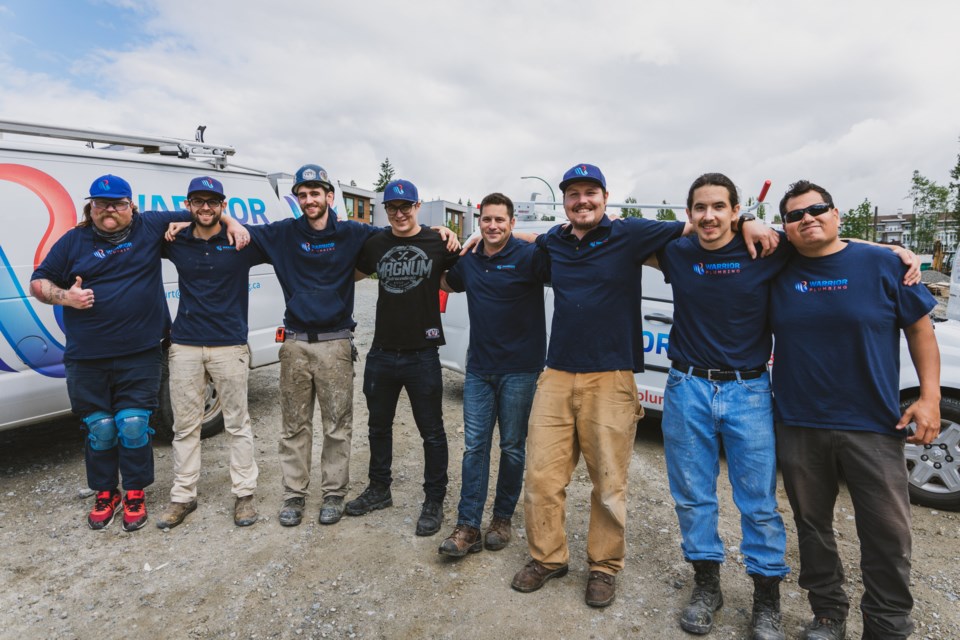Curtis Thomas has a big vision for his company. Not just about making money, Thomas wants to provide opportunities for the local Indigenous community.
“I'm a plumber and gas fitter by trade, but I'm passionate about helping people. I think that's what's driving this apprenticeship program forward,” Thomas said.
Earlier this month, Warrior Plumbing launched an Indigenous Youth Apprenticeship Partner Program, which hopes to give Indigenous youth on-the-job training and employment in the trades sector. The program will sponsor youth under the guidance of the Industry Training Authority, the provincial government apprenticeship agency.
Started by Thomas in 2010, Warrior Plumbing was somewhat of a natural progression after Thomas was guided into the trade years earlier by his late uncle, Tsleil-Waututh Nation Chief Leonard George.
Recounting a conversation he had with his uncle when he was 22, Thomas said George asked him if he’d considered starting a career in the trades.
“He said to me, ‘We're developing the Raven Woods community, and it's about more than our Nation making money, it's about providing career opportunities for our people. And that's equally as important.’”
Soon after, Thomas, who is also a second-term Tsleil-Waututh Nation Councillor, began his apprenticeship under the wing of a local plumbing business and two years into his apprenticeship, ended up back at home working on a project for the Nation.
“I ran into my uncle Leonard and he pulled me aside and he said, ‘Hey son, I just wanted to let you know I'm really proud of you. I've heard you completed your first two years of technical training. And I just want you to know that this is really important, and important to me, and keep up the good work,” Thomas said, adding George could foresee something in the future he couldn’t just yet.
“One day, you're going to have your own company, and one day you're going to be hiring kids from our community. One day, you're going to be running the jobs over here,” George said to Thomas.
Thomas and Warrior Plumbing have since been able to take on about 20 employees over the course of the business, and with the new apprenticeship initiative, are looking to take on 20 more.
“Although this program is very new for us, it's something that we're going to carry with us for the remainder of the life of our company. It's always going to be of the utmost importance to us, because I was fortunate to have the same opportunity.”
Thomas aims to take advantage of the vast number of Indigenous real-estate developments across the Lower Mainland, including those headed up by TAKaya Developments and MST Development Corp., the joint venture between xʷməθkʷəy̓əm (Musqueam Indian Band), Sḵwx̱wú7mesh Úxwumixw (Squamish Nation) and Tsleil-Waututh Nation.
“I do want to hire people from the Tsleil-Waututh Nation, but I [also] want to hire Indigenous people, because for a long time, we've been left out of the local economies,” he said. “And we're seeing this paradigm shift -- MST Development Corporation has 200-plus acres of the most highly developable land in the Lower Mainland, and we should be the ones working on those projects.”
In 2017, Warrior Plumbing won its first major contract, Thomas said, allowing it to be part of the Seymour Village development by TAKaya Developments and Aquilini Investment Group.
“We built the first 50 townhomes at Seymour Village, and I've been working there ever since.
“I'll always remember my Uncle Leonard. I'm thankful for his vision and planting those seeds in me as a young man,” Thomas said.
“It still resonates with me today, the importance of providing opportunities for people, and in turn, creating well-paying careers. Those people now become role models walking through our community, when they can go home and they can live a comfortable, healthy lifestyle, and provide for their families.”



